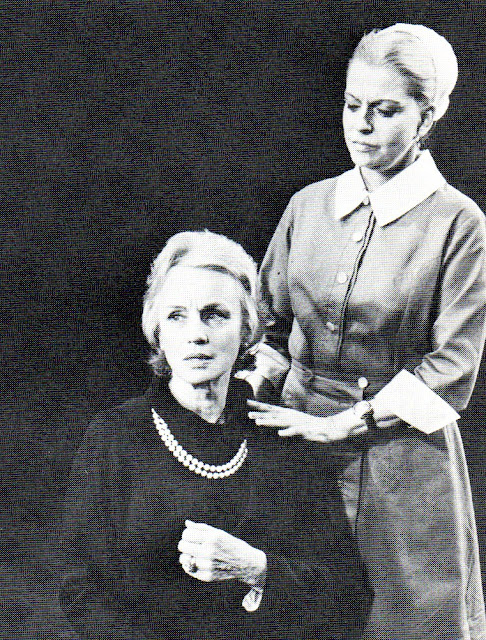The following precedes each entry,
"In Lieu of Reviews"
Around 40 years ago, I began a major project that eventuated in the
publication of my multivolume series, The Encyclopedia of the New York
Stage, each volume covering a decade. For some reason now lost to the sands
of time, I chose to start with the 1970s. After writing all the entries through
1975 and producing a typed manuscript of 1,038 pages my publisher (Greenwood)
and I decided it would be best to commence with the 1920s. So the 1970-1975 material
was put aside as I produced volumes for 1920-1930, 1930-1940, and 1940-1950.
With those concluded, Greenwood decided it was all too expensive and not
sufficiently profitable, so the remaining volumes were cancelled, leaving my
1970s entries in limbo.
To compensate, I used the research I’d done on the 1970s to write a
book for Greenwood called Ten Seasons: New York Theatre in the
Seventies, which described all aspects of that era’s theatre, onstage and
off. Many years later, in 2012, I began a postretirement “career” as a theatre
reviewer, which led to my creating this blog as an outlet for my reviews. Over
the past eight years or so I’ve posted nearly 1,600 reviews, a substantial
number having first appeared on other websites: Theater Pizzazz, The Broadway
Blog, and Theater Life.
Now, however, with the New York theatre in suspension, and my
reviewing completely halted, is probably the perfect time to post as many as
possible of the entries I prepared for the never-published 1970-1975 book. The
entries that follow are in alphabetical order. Each entry has a heading listing
the subject categories of the work described: the author (A), the director (D),
additional staging (ADD ST), when credited; the producer (P), the set designer
(S), the costume designer (C), the lighting designer (L), the source (SC), the
theatre (T), the dates of the run, and, in parentheses, the length of the run.
The original entries also contained the names of all the actors but I’ve
omitted those here.
I will try to post at least one entry daily. When time allows, I’ll
provide more. The manuscript exists on fading, fragile paper and, because no
digital files exist, must be retyped. Hopefully, the tragic health situation
we’re all enduring will abate before I get too far into posting these entries
but, for the time being, devoted theatre lovers may find reading these
materials informative.
 |
| George Voskovec, Colleen Dewhurst, Jessica Tandy. |
Despite its star-spangled
production, Edward Albee’s 11th play and his first full-length original since
1966’s A Delicate Balance was a crushing
Broadway flop. As with most of his recent outings, it met with a good deal of
critical hostility. Clive Barnes was at least 85 percent on the play’s side but
enough bitter opposition came from the remaining critics for the play to have
difficulty at the box office. Had it not received support from the Theatre
Development Fund, and from actors, producers, and theatre managers willing to
take an 80 percent pay cut, it would have closed in a week.
 |
| Madeleine Sherwood. |
All
Over is about a family given the allegorical,
depersonalized names of the Wife (Jessica Tandy), the Mistress (Colleen
Dewhurst), the Daughter (Madeleine Sherwood), the Doctor (Neil Fitzgerald), the
Son (James Ray), the Best Friend (George Voskovec), and the Nurse (Betty
Field), who wait in a living room for a famous man (never seen), dying in the
next room, to pass away. The characters talk of him and of their role in his
life.
As Harold Clurman
explained it, “Albee is saying that, despite all the hasty bickering, the
fierce hostility and the mutual understandings which separate us, we need one
another. We cry out in agony when we are cut off.”
The ambitious drama,
staged expertly by the great British actor-director, Sir John Gielgud, was
acted in a superbly stark, symbolic set created by Rouben Ter-Arutunian. The
performances of the high-powered company were applauded by all. The play
itself, though, was seen as self-conscious, overwritten, pompous, vacuous, dry,
abstract, and too literary. “The language [is] a stilted, priggish, pedantic .
. . Victorian lingo never heard on land or sea,” nagged Jack Kroll. Walter Kerr
was alienated by the play’s “extraordinarily remote, detached, noncomittal”
atmosphere.
The action was viewed as
insufficiently dramatized, and the characters were “thin and sketchy” (T.E.
Kalem), “painted dummies” (Kroll), and “bloodless, unreal people” (Douglas
Watt). Martin Gottfried yawned along with many others at how “unbelievably
boring” it all was.
 |
| Jessica Tandy, Betty Field. |
Still, All Over’s defenders, such as Barnes,
appreciated its “lean, nervy and high-flown” style. He described it as a “lovely,
poignant and deeply felt play,” and as a demanding one at that. Henry Hewes
stated it was “a realistic and honest effort,” and Clurman called it “the best
American play of several seasons.” Colleen Dewhurst and Jessica Tandy were
exceedingly good, the former receiving a Drama Desk Award for Outstanding
Performance, the latter a Tony nomination for Best Actress.
The play had multiple revivals regionally and abroad, including one directed in 1975 by Peter Hall for London’s Royal Shakespeare Company starring Peggy Ashcroft and Angela Lansbury as, respectively, the Wife and Mistress. Its sole New York revival to date was Princeton's McCarter Theatre production, directed by Emily Mann, presented by the Roundabout Theatre Company, which opened at Off Broadway's Gramercy Theatre in June 2002, starring Michael Learned as the Mistress and Rosemary Harris as the Wife.
Previous
entries:
Abelard and
Heloise
Absurd Person
Singular
AC/DC
“Acrobats”
and “Line”
The Advertisement
Aesop’s Fables
Ain’t Supposed to
Die a Natural Death
Alice in
Wonderland
All God’s Chillun
Got Wings
All My Sons



